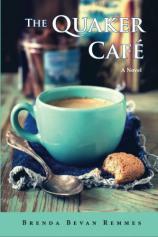Reading Group Guide
Discussion Questions
The Quaker Café

1. There is a Shaker song written by Elder Joseph Brackett in 1848 that was used primarily as a dance tune:Tis the gift to be simple, 'tis the gift to be free
'Tis the gift to come down where we ought to be,
And when we find ourselves in the place just right,
'Twill be in the valley of love and delight.
Quakers have used it to emphasize their testimony to a “simple” life. In your view, what does “living a simple life” entail? Can you have a simple life in today’s society?
2. Do you believe that Grandma Hoole was too hard on Liz, or was she correct in her efforts to point out to Liz that living life in a frenzy of activity diminishes the value of the more important things?
3. Truth is another paramount testimony of Quakers. In fact, they refuse to take an oath in court to swear to tell the truth because they maintain that the oath implies that one does not always tell the truth. They affirm that they are telling the truth as they always do. Grandpa failed to tell the truth at a crucial moment in his life. What do you think he should have done differently at each stage?
4. This story was set in 1992 in a small southern town. Do any of the same issues remain in our communities today? What has changed?
5. The theme of this book is that good people make bad choices which can have unintended and sometimes tragic consequences for the innocent. Who made choices that you think should never be forgiven?
6. Do you feel that the black community was represented in a manner that respected not only the maids and field workers, but also the ministers and other professionals of that community?
7. In what ways were the First Methodists, Jerusalem Baptists and Quaker worship styles different? Do their styles indicate to you conflicting beliefs in any way?
8. In what ways could Issac Perry’s death have been avoided. How many people played a role this tragedy?
9. Johnson Perry’s life was evidently destroyed by his burning hatred over what had happened to his father. Do you consider him an innocent victim of the crime or a man to be judged by his own wrongdoing?
10. It is not uncommon for people to try to redeem themselves by doing “good deeds.” Do you believe that Grandpa Hoole had been redeemed in the eyes of the community?
11. My first ending to the book had LuAnne shooting and killing Grandpa in the scene in the pharmacy. A few people have said that would have been a better ending, ultimate vindication for LuAnne. What do you think?
12. These men were portrayed as fathers: Grandpa Hoole, Chase Hoole, Issac Perry, Johnson Perry, Rev. Shannon and the Judge. Who among them fulfilled their role as a good father?
13. Several strong women were portrayed: Liz, Maggie, Billie, Grandma Hoole, LuAnne Perry, Debbie Bradshaw and Helen Truitt. Which one did you identify with the most? Why?
The Quaker Café
- Publication Date: March 25, 2014
- Genres: Christian, Christian Fiction, Fiction, Women's Fiction
- Paperback: 400 pages
- Publisher: InkWell Publishing
- ISBN-10: 0615957978
- ISBN-13: 9780615957975








